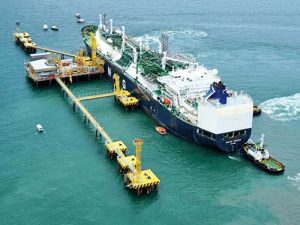The government has decided to sell LNG plants to Qatar and is forming a committee to expeditiously sell the power plants in order to prevent default.

ISLAMABAD: To raise an estimated $1.5 billion and sell these public assets to Qatar directly in order to avert a potential sovereign default, the government surreptitiously delisted two power facilities that had been put on an active list for privatization over four years ago.
The change occurred two days after the government established a new cabinet committee with the goal of selling state assets quickly. This committee will now be given the 2460 MW LNG-fired power stations so that it can locate a suitable overseas buyer.
According to sources, the Privatization Commission Board (PCB) met on Thursday to discuss the removal of the plants from the privatisation plan. Abid Hussain Bhayo, the minister for privatisation and board chairman, presided over the meeting despite not being physically present in the city.
The PCB typically makes a news release following a board meeting, but this time no statement was made, ostensibly to maintain the privacy of the topic.
Requests for comments were not answered by the secretary of privatisation or the minister of privatisation. According to the sources, the board has advised the Cabinet Committee on Privatization to remove the power plants from the list of facilities eligible for privatisation (CCOP).
The privatisation list only contained these two significant assets. A Privatization Ministry or a Privatization Commission’s continued existence will be in doubt after their removal.
Both of the power facilities were put on the list of active privatisations by the previous PTI administration in an effort to earn about $1.5 billion for budget funding. However, it has failed to resolve the problems or get Rs103 billion in additional loans to pay off the government equity during the last more than four years. Instead of the 70:30 debt to equity ratio benchmark authorised in NEPRA’s tariff for NPPMCL’s power plants, these plants were constructed with government finance during the previous PML-N administration. They are owned by the National Power Park Management Company (Private) Limited (NPPMCL). According to the sources, the board meeting was informed that the PM’s office wanted the plants to be delisted in order to sell them in accordance with the Inter-governmental Commercial Transaction Act of 2022.
The Privatisation Ordinance of 2000’s lengthy and onerous process is replaced by the 2022 law, which permits the direct transfer of assets to foreign countries. While the direct sale structure may raise transparency concerns because the decision would be largely made by the government without going through a competitive procedure, the lengthy process nevertheless provides transparency.
One opinion holds that Qatar will only receive 30% of the equity and that the price will be determined using known variables, which will lessen the element of discretion.
Due to the IMF program’s resurrection being delayed, Pakistan faces an immediate threat of sovereign default (IMF). The sale of the LNG-fired power stations has been identified by Finance Minister Ishaq Dar as one of the “low-hanging fruits” that would be sold to raise foreign cash. Dar has angrily refuted the claim that Pakistan will stop making payments on its debt.
After making two commercial loan debt payments totaling $1.02 billion on Friday, Pakistan’s gross official foreign exchange reserves fell below $4.5 billion. According to the central bank, the entire amount of debt repayments for the current fiscal year is $23 billion.
The PCB had made the decision to re-engage Credit Suisse, Singapore in September 2022 to estimate the cost of the multibillion-dollar LNG-fired power projects that Qatar had been attempting to buy for the previous four years.
However, Credit Suisse has established the requirements of paying its roughly $1.7 million in unpaid debts and resolving three significant unresolved concerns that have prevented the privatisation of two LNG power plants with a combined generation capacity of 2,560MWs.
Pakistan hired Credit Suisse in April 2019 to sell the plants, but the agreement only lasted until October 2020 before being extended for a further 1.5 years. However, due to the underperformance of all parties, the contract ended once more on April 29, 2022.
Qatar promised the IMF board in August of this year that it would invest $3 billion in Pakistan, including the purchase of both plants, in order to close a financing shortfall noted by the IMF staff.
A new Cabinet Committee on Intergovernmental Transactions has been established, with the approval of Prime Minister Shehbaz Sharif.
Ishaq Dar, the finance minister, would serve as the committee’s convener, according the notification. The members will include the ministers of trade, communication, power, law, and justice, as well as the ministers of the board of investments and of state for petroleum.
According to the announcement, the Cabinet Committee will approve discussions for a G2G agreement between the federal government and the government of a foreign state. Additionally, it will establish a committee for direct agreements or commercial agreements, depending on the situation, and authorise the price discovery process.










































